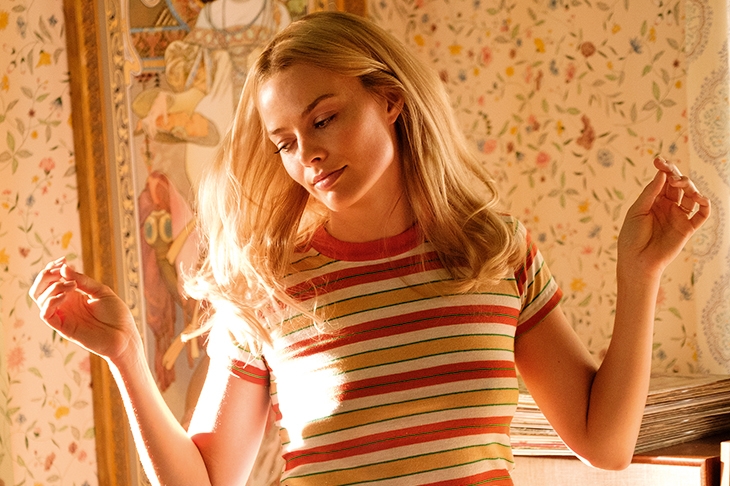Quentin Tarantino’s latest film, Once Upon a Time in Hollywood, is a sprawling tale set in Hollywood in 1969, against the backdrop of the Manson murders, so it’s not a meditative, rural parable, just to be clear. No changing seasons, autumnal leaves, frosty mornings or any of that. Instead, he’s trying his hand at combining retro pop culture, violence and revenge fantasy… OK, it’s business as usual and, as usual, it has been hailed as ‘a masterpiece’ in some quarters and yet another ‘woman-hating’ travesty in others. The truth, as ever, lies somewhere in between. Violence-wise, you only have to brace yourself for the last 15 minutes, when all hell lets loose. (The film is two hours and 45 minutes so you get a good run before having to brace yourself.)
It stars Leonardo DiCaprio as Rick Dalton, former star of a western TV series, now teetering on the edge of has-been status. (He is, apparently, based on Pete Duel, the one we all fancied from Alias Smith and Jones; I can’t remember the other one!) Dalton is sometimes buoyant and sometimes down and, I guess, would probably be diagnosed as bipolar today. He has one friend and this is Cliff Booth (Brad Pitt), his long-time stunt double who is also facing obsolescence and is now Dalton’s gofer. Dalton lives in the Hollywood Hills alongside his new neighbours, Roman Polanski and Sharon Tate (Margot Robbie), while Cliff lives across town in a camper van with his pit bull, Brandy. Just as we have ‘Chekhov’s gun’, maybe we should have ‘Tarantino’s pit bull’? You just know that dog isn’t there for no reason.
This is a loose, meandering film as the two hang out, get sloshed, try their hand at TV pilots, and encounter the likes of Bruce Lee (Mike Moh) or Sam Wanamaker (Nicholas Hammond). Tarantino references all the film, radio and television of the time as well as himself, of course. A film producer (Al Pacino in an uproarious cameo) congratulates Dalton on his back catalogue as a gun-toting baddie: ‘I love that stuff… the killing.’ ‘A lot of killing,’ confirms Dalton. So meta.
Meanwhile, Tate is glimpsed partying at the Playboy mansion, stealing in to watch herself in one of her films at an LA cinema, driving with Polanski in a sports car through the Hills. She has few actual lines and is more an idea than a real person, even though she’s the one who was a real person, which does seem a bit shitty. Does her story not matter? And there is certainly a huge imbalance between Robbie’s role and those of the leading men. But I was mostly just confused as to what Tate’s purpose was here. Is she meant to be the embodiment of innocence at a time when, as this film suggests, Hollywood lost its innocence towards the end of the 1960s? Was Hollywood ever innocent? Would Judy Garland have said it was? I just didn’t get it is probably the most honest way of putting it.
There are certainly some outstanding scenes. At one point Booth ends up at the Manson ranch which was once used as a set for westerns and this plays out like a western itself, which is brilliant and riveting and fantastically creepy. In another, Dalton banters with a child actor who seems to be signalling that method acting is on its way and, again, it is riveting. As for DiCaprio and Pitt, you cannot take your eyes off them. Both are now showing signs of middle age, and there is something incredibly poignant and transfixing watching them play men now showing signs of middle age. Robbie is gorgeous, needless to say, but that’s all she’s allowed to be.
I can’t say what this adds up to. I can only say I was never bored and while the ending — brace yourself — has proved divisive, I took it as Tarantino’s way of basically sticking two fingers up at the audience: you expected one thing and I gave you another, so who is the big daddy? And just so you know, ‘Tarantino’s flamethrowing device’ could also be a thing.






Comments